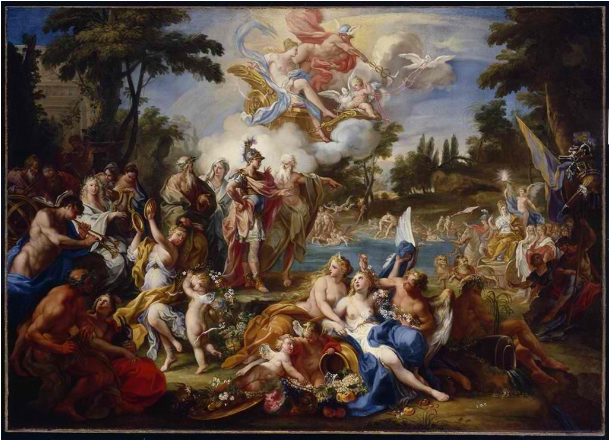“A high station in life is earned by the gallantry with which appalling experiences are survived with grace.”
— Tennessee Williams
“Poker should not be played in a house with women.”
— Mitch, A Streetcar Named Desire
Clad in white, Blanche DuBois takes a streetcar named Desire and gets off at Elysian Fields. Elysian Fields: the loud, vibrant, and sensually alive setting for William’s masterpiece grounds the piece in the real. Simultaneously, it elevates the struggle between Stanley and Blanche to mythological proportions. Williams describes Blanche as a moth. And, like a moth, she flutters seemingly inexplicably towards the blazing sun of New Orleans. Immediately, we know Blanche does not belong in the world she has entered. Undoubtedly the beauty and delicacy of Blanche will not be able to withstand the roaring fire of New Orleans encapsulated by Stanley’s“heaven splitting” roar.
Sebastiano Conca’s painting, The Vision of Aeneas in the Elysian Fields
The viscous heat and raucous atmosphere of New Orleans in the 1940s is more than a backdrop for the battle for ascension and mastery that makes the action of A Streetcar Named Desire, it is an active participant. The luxuriousness of bourbon has to exist side by side with the suffocating and cacophonous energy of the Elysian Fields. In Streetcar, Tennessee Williams, who believed that, “Symbols are nothing but the natural speech of drama,” indulgently embraces the symbolism of the Elysian Fields. In Greek mythology, the Elysian Fields were the final “resting” place of the happy dead. The heroes that the gods honored with immortality lived in “Elysium“ or the Elysian Fields. In book six of the Aeneid, Virgil describes the Elysian Fields as vibrantly alive, “Whatever, living/The men delighted in, whatever pleasure/Was theirs in horse and chariot, still holds them/Here in the underworld./Some grapple on the grassy wrestling-ground/In exercise and sport,/and some are dancing,/And others singing” (166). Blanche is seeking solace in the shadows of New Orleans but is instead confronted by a rowdy purgatory. In Elysian Fields, she is punished by her memory as she relives the death of the Grey Boy in Promethean fashion.
The macho and vital paradise of the Grecian underworld also includes a love of game playing as a motif that is repeated throughout Streetcar in the never ending game of Seven Card Stud. A good poker player is lucky, strategic, and probably a good liar. The reality of each hand matters less than what all the players at the table perceive the reality of the hand to be. This man’s game is a central symbol in A Streetcar Named Desire. In it’s form of betting and bluffing, the seemingly continuous game of poker in the Kowalski’s New Orleans flat mirrors the contest between Stanley and Blanche as they trade who has the upper hand. The game playing reinforces the mythological aspects of Streetcar while representing the titanic clash of truths between Stanley and Blanche as they try to sway the other characters, like Stella and Mitch, to their version of history. Blanche can bluff with the best of them. She prefers the world of illusion and strategic misrepresentation, “I don’t want realism, I want magic! [..] Yes, yes, magic! I try to give that to people. I misrepresent things to them. I don’t tell the truth, I tell what ought to be truth And if that is sinful, then let me be damned for it!” Blanche is damned since she can’t play in the game of men. She calls herself “unlucky” and “played out”; without a seat at the table with the men, she is reduced to kibitz. The public man’s world of poker stands as an unconquerable outpost in the romantic illusory world of Blanche’s creation. The poker game will inevitably eventually swallow her whole when Stanley “goes all in.”
The aggressive masculinity of the New South rewrites the past and dictates the future of feminine Old South. Only Tennessee Williams possesses the brilliance, poetry and fluidity to give this story life. The clash for authority between Stanley and Blanche encapsulates the interpersonal as well as the sociopolitical in a way that makes this 1947 masterpiece relevant to this day. Only Williams, who Kenneth Holditch describes as, “the poet of — and the dramatist of — the outcast. He’s fascinated by and champions those people who have been pushed outside the mainstream of society for some reason or other,” can so effortlessly tell a story that is simultaneously grounded in grit of the real as it transcends into the realm of universality. In this sense, Williams’ poetic realism is the only language appropriate to tell the story of two modern heroes fighting tooth and nail to claim the highest point in the Elysian pantheon.
The iconic Pulitzer Prize winning playwright, Tennessee Williams



